Ricochet is the best place on the internet to discuss the issues of the day, either through commenting on posts or writing your own for our active and dynamic community in a fully moderated environment. In addition, the Ricochet Audio Network offers over 50 original podcasts with new episodes released every day.
 Our Next Parisian Suburb: Gennevilliers
Our Next Parisian Suburb: Gennevilliers
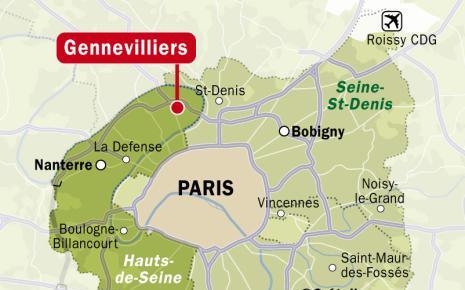 So, let’s continue our multiple-part series about the infamous Paris suburbs with many incredible twists and turns. I understand there’s a lot of interest about these neighborhoods. Gennevilliers an interesting one, because reportedly there’s now a cemetery there with an unmarked grave. It contains a terrorist who grew up there: one with whom I’d say my relationship is a bit too personal, since — a few weeks — ago I stumbled over his handiwork. I’m curious about this terrorist, given that the act of terrorism he committed made major headline news recently. So I’m curious about this suburb:
So, let’s continue our multiple-part series about the infamous Paris suburbs with many incredible twists and turns. I understand there’s a lot of interest about these neighborhoods. Gennevilliers an interesting one, because reportedly there’s now a cemetery there with an unmarked grave. It contains a terrorist who grew up there: one with whom I’d say my relationship is a bit too personal, since — a few weeks — ago I stumbled over his handiwork. I’m curious about this terrorist, given that the act of terrorism he committed made major headline news recently. So I’m curious about this suburb:
[Gennevilliers is] a Paris suburb is the final resting place of one of the two brothers who launched the deadly attack on the offices of the magazine, Charlie Hebdo.
Cherif Kouachi was buried in an unmarked grave in the cemetery of Gennevilliers, his home town [emphasis added].
The burial took place amid tight security. No relatives were present. Earlier in the week his brother, Said was laid to rest in the town of Rheims. Initially the mayor had wanted to refuse the burial but French law dictates residents have a right to a burial in their home town. The Mosque in Gennevilliers refused to conduct Cherif Kouachi’s final rites within its walls for fear of angering members of the community.
From what’s been reported, you’d think this terrorist was the product of a dangerous war zone, wouldn’t you? One into which even the cops dare not enter and Sharia is the law of the land?
But this is truly preposterous. Of course you can walk through Gennevilliers. It’s much nicer than Clichy-sous-Bois, and I certainly didn’t need to waste an afternoon proving that to myself, either. I knew it, and basically, had to do it only because I knew if I didn’t, someone would tell me that it’s impossible. Now I can say “Well, clearly not. Here I am.”
And yet: Something did happen that resulted in the Kouachi brothers thinking it would be a good idea to go on a massive killing spree in my heart-of-central Paris neighborhood. So you’d think people would be curious about whether this place is really a no-go zone.
It’s not. Forget that idea.
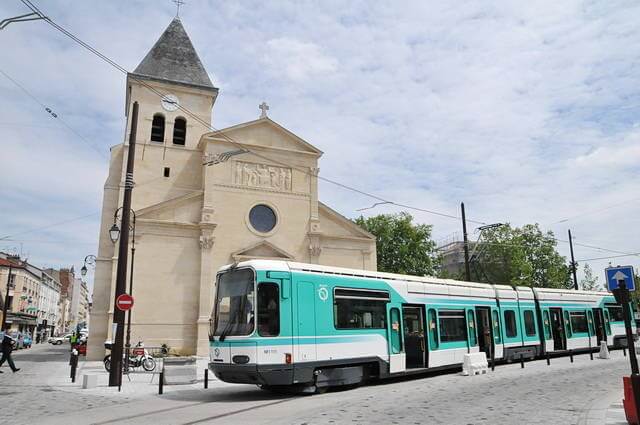 What’s in fact there? A drab suburb that’s very well-served by public transportation. I saw a single banner that said “Gennevilliers is united against barbarity and for freedom of expression,” and that’s the only hint I saw that something odd had happened recently. There’s a lovely cultural center dedicated to a French Caribbean writer I’d never really given much thought to. I had a nice chat with the woman there about all the activities coming up at the cultural center: an artisanal chocolate tasting, manicure classes, and lots of other things nice, middle-class people might like. She may be a Muslim, for all I know, but she looked like your typical, old-fashioned stereotype of a young French woman: pretty, nicely-dressed, and eager to talk about a French writer you’ve never heard of and artisanal chocolate. She sure wasn’t living in fear of the local war lords. Looks like there’s an excellent library there. I’d guess the medical care is first-rate, judging from the number of well-stocked pharmacies I saw.
What’s in fact there? A drab suburb that’s very well-served by public transportation. I saw a single banner that said “Gennevilliers is united against barbarity and for freedom of expression,” and that’s the only hint I saw that something odd had happened recently. There’s a lovely cultural center dedicated to a French Caribbean writer I’d never really given much thought to. I had a nice chat with the woman there about all the activities coming up at the cultural center: an artisanal chocolate tasting, manicure classes, and lots of other things nice, middle-class people might like. She may be a Muslim, for all I know, but she looked like your typical, old-fashioned stereotype of a young French woman: pretty, nicely-dressed, and eager to talk about a French writer you’ve never heard of and artisanal chocolate. She sure wasn’t living in fear of the local war lords. Looks like there’s an excellent library there. I’d guess the medical care is first-rate, judging from the number of well-stocked pharmacies I saw.
I bet some of the guys hanging out at that cultural center were Muslims. It’s entirely possible that if I sat down to talk to them, I’d find out that they hold views I find objectionable. But I’d bet very good money that they and I could exchange our views without killing each other. If anyone doubts this, I’m happy to perform that experiment, but it’s a waste of my time and yours. That’s what would happen.
Sure, I saw distinct signs of “suspicious Muslim activity” — as in, “a few halal butcher shops” — but, trust me, that really isn’t suspicious unless you’re a vegetarian (I am, but that’s another story). It’s clean and orderly. There’s a street named after Lenin, but I can walk down a street named after Lenin without dying, even if I’m offended by that. There are also streets there named after Beethoven and Mozart, of which I approve. It doesn’t remotely look like a terrifying no-go zone. If I can wander around there saying, “Hi, where do I find a bathroom,” and be directed to one by polite and helpful people, it’s really not a no-go zone. While I didn’t personally examine the men’s room — there is some journalism I’m unwilling to do — I’m given to understand that it’s entirely satisfactory.
It’s no problem — I can say with confidence — for an American woman to walk around that neighborhood on a normal Saturday, in normal garb, and say, “Hey, what’s this neighborhood like?” It’s a place so lawful that the mayor couldn’t even say, “We don’t want him buried here,” because there’s a law, on the books, that says residents have the right to be buried in their home town. It’s a place where the mosque sure isn’t conducting his funeral rites, although they’re holding effigies for him in other parts of the world (Including in neighborhoods I’ve gone to, and no, that wasn’t a spectacular act of brave journalism, either: just the normal thing you’d do if you live there and want to know what’s going on).
What’s especially baffling to me is that the US does actually have spectacularly brave journalists who really do know what a dangerous war zone looks like, and know damned well when you need a flak jacket. So what’s up with this?
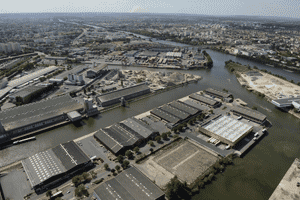 That suburb is normal, prosperous, and developed, except for the mystery no one talks about: the banal ugliness. The total destruction of the genius that made Paris a beautiful city. That strikes me as interesting and worth more than a few questions, but I reckon the street named after Lenin holds a hint–though not more.
That suburb is normal, prosperous, and developed, except for the mystery no one talks about: the banal ugliness. The total destruction of the genius that made Paris a beautiful city. That strikes me as interesting and worth more than a few questions, but I reckon the street named after Lenin holds a hint–though not more.
What does it say that I had to waste a day, only to learn that “This debate isn’t even ‘in the right direction?'” Why are talking heads on television having feuds about the stuff anyone could tell you? Gennevilliers is perfectly safe for journalists. They should be going there, and they shouldn’t be confusing “black people” or “Muslim people” with “Muslim people who kill journalists and Jews in Paris”; if such people were in a majority in the neighborhoods I’ve visited, I’d be long since dead. Simple as that. I’ve got private health insurance. The people who issue it to me are in the business of making actuarial tables and calculating the odds for expats. Their questions about my lifestyle and the risks to my health are grounded firmly in reality, and they’re not charging me a warzone premium.
After finishing the excursion to Gennevilliers, the guy who gave me a lift dropped me off near the flea market (otherwise he’d have been stuck in traffic). The flea market is another place people are always telling me is “completely unsafe,” but it’s obviously not. You don’t think “Hey, just drop me off here and I’ll walk back or take the metro, so you don’t get stuck in traffic,” if the place is “completely unsafe.” It’s somewhere I go all the time, because you can buy things cheaply there.
After establishing for the millionth time that it’s safe, I wandered north by accident (serves me right for mocking the French for their inability to master Cartesian coordinates). That’s the direction people who don’t really live here keep telling me that I’ll die instantly if I walk into it. I ended up walking about a half a mile there; beyond feeling a bit dumb for laughing at people who can’t figure out which way is north — and then not checking “which way is north” — it was, as usual, a lovely Saturday evening in Paris. Yes, “European people” walk there. They were, in fact, roller-blading there. The last thing I felt was worried for my safety. Nor would it have been in any way reasonable to be. The point at which I reacted — rationally — with real concern for my safety was on the Périphérique, not beyond it. That had me screaming. Rationally.
This is a safe, first-world city with great public transport (except for Clichy), water you can drink right from the tap, and well-stocked pharmacies right in what’s being described as the Heart of Darkness; and a fairly low crime rate for a big city, all considered.
And it has some dead serious problems, which are worth reporting. In a serious way. Some things happen here that are truly abnormal, and thus deserve serious journalism. Abnormal? That scene at Charlie Hebdo. I knew the second I saw it that we had “abnormal” on our hands. But that sure didn’t happen in these terrifying ‘burbs. That was actually my neighborhood.
So what actually happened in Gennevilliers — obviously a pleasant-enough ‘burb — that resulted in an “international news-level abnormal” terrorist attack a few blocks from my safe and very tourist-friendly neighborhood? I’m frankly none the wiser for an excursion there. But I don’t think anyone is ever going to be the wiser about my much-less-normal excursion down that street in my own neighborhood, which is emphatically not a no-go zone nor even a “sensitive zone.” Not at this rate. Because no one gave me the “Please, no more media, no more questions” treatment in Gennevilliers. So I’d guess there’s been no American media there, really.
I walked into a very abnormal scene in front of Charlie Hebdo: a statistically unlikely event. But I saw few signs that the US media is really asking, “So why did that happen?” in a way that might lead to real answers. Although I’m sure that yes, French security officials are. Yes, obviously there’s a “connection to Islam,” but no, not all Muslims in France do that. No, they do not all secretly approve of it. No, it’s not because Islamic law has been imposed in Gennevilliers, or anywhere in France.
Figuring out exactly what happened is supposed to be the job of all these people who are talking about it without even looking at it. The question, “How exactly do things like this happen” might have policy implications even in far-away places like America, after all. Wouldn’t you expect every last man, woman and child in Gennevilliers to take one look at an American journalist and be afraid to talk to me, rather than lonely and eager for a chat about fondue? Shouldn’t it have taken me lot of time and patience to win the locals’ confidence and get them to tell us what’s really going on here, because they’re all-too-used to an American media who exhibit a great deal of curiosity in them?
Anyone who tells you Cherif Kouachi came from a neighborhood you can’t walk into — a place where the women are veiled, Sharia has been imposed, and the police dare not enter — is out of his mind. “Out of your mind” is no place to start when you’re thinking about things as worthy of a serious conversation as terrorism, attacks on Jews, rising anti-Semitism in Europe, freedom of expression, and Islam (or the National Front, for that matter).
Now, I have lots of theories about what produced him. I suspect the places you’d start looking — for real — are in a mosque in the 19th Arrondissement that’s long been (sensibly) razed to the ground. I’d ask about French prisons and what happens in them. I’d also like to know about the algorithms French security officials use to decide whether someone like him should be kept under surveillance, given limited police resources. But this is speculation based on local media reports, not facts. (The place Amedy Coulibaly his been discreetly deposited is reputed to be serious scum-of-the-earthville, and I’m inclined to believe that, by the way. I’ve heard from enough people that this is where you find the real racaille that I’d probably only go there in broad daylight.)
My other hunch would be that if those algorithms were involved, they’re revising them. French security officials may not have infinite resources, but they are not stupid. France is a First World place where “new data makes educated people change the algorithms.”
But that’s a hunch, not at all a fact. I’d like to know the facts. But at this point, I’ve so lost confidence in what’s being reported in the news that it looks like I’ll have to verify every fact personally with my own eyes, by which point it won’t be in the news anymore, but at least I’ll understand the story. I’m losing every bit of confidence in the media to get even the basics right, even when it concerns one of the most well-known cities in the world. I shouldn’t have to waste time proving the obvious; I should be spending it looking for what isn’t utterly obvious.
But even if I have to do every bit of the reporting myself, I know I should do it. Figuring out how that really happened is pretty important, especially if you prefer it not happen again.
But our next suburb, because I could use a break, will be Neuilly-sur-Seine, an absolutely gorgeous suburb that no real person can afford to live in:
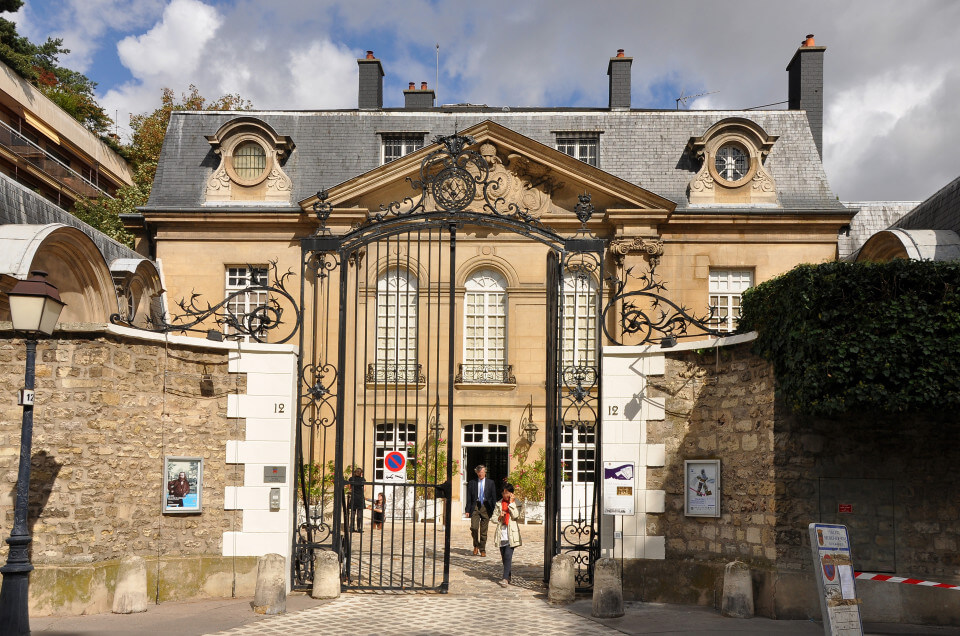
I reckon it’s very safe to walk there, too:
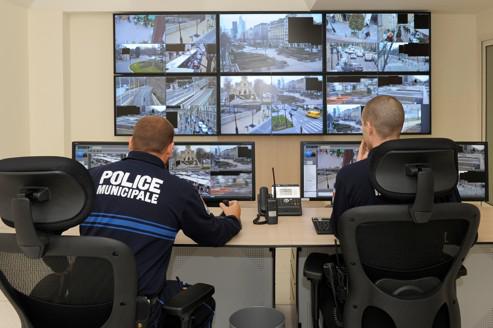




I’m with iWc on this one.
Claire, you can potentially change my view if you can provide URLs or whatnot where I can see accounts about the Muslim version of Ilan Halimi.
Likewise, you can potentially change my view if you can provide similar material having to do with baying crowds of Jewish hooligans swirling about a mosque on a Friday (or other day of large-scale Muslim prayer), pitching a variety of objects at the facility and forcing the worshipers inside to remain there for an inordinate length of time. (And by “crowds of Jewish hooligans,” only several hundred of them [minimum] can count; “street gangs” numbering under, say, thirty or even forty people — such as the JDL units in the Marais that you referred to in an earlier essay — don’t count.)
Look: I vigorously agreed with you in the last installment that American media types are as bad as you make them out to be, and I didn’t actually need your digging into the situation in this or that banlieu to buttress the point.
But I also remarked in the last installment that there appears to have been a discontinuity, within the general Muslim population in those banlieus, in terms of what state of affairs was deemed acceptable-versus-abhorrent in years past, as compared with the present-day state of affairs, where even if many (most?) among that population aren’t on-board with what in the past they would have deemed unacceptable (even abhorrent), nevertheless they are in the main quiescent — and even exhibit indignation when that quiescence is criticized among the broader public, especially in but not limited to the aftermath of a (soi-disant) jihadi atrocity (including those explicitly targeting Jews).
Statistically, it must be (as iWc posits) that “no-go-zone” is a functional term and a valid phenomenon specific to those who are overtly Jews — hell, the Muslims are taking the attack to such Jews in their own (Jewish) neighborhoods with such statistically verifiable frequency that it would be laughable to deny the n-g-z phenomenon — as regards the overtly Jewish — back in the various enclaves where the Muslim hooligans and would-be jihadis make their homes.
(And no, Claire, you don’t look obviously Jewish, at least not so far as a Google images search indicates. Sure, you’re of Litvishe origin — so am I. I get seriously and frequently mistaken for Irish-American, by Irish-Americans [or for Scots-Irish by Scots-Irish if they know my surname is Alexander]. So so much for being a full-blooded Litvak. Sure, yeah, if you identify yourself by name, you probably give the game away there. But that’s not the point. The *identifiably*, “obviously” Jewish in the French context are the NorAfs, the Sephardic Jews whose families [as you know] came from Morocco/Tunisia/Algeria/Libya/Egypt. Yes, she’s of Yemenite origin, but to take an extreme example, think of Israeli pop singer Achinoam Nini — *that’s* an identifiably NorAf-style Jewish look in France. Even without giveaway garb sported by the more religious Jews. The non-religiously-attired-but-in-physiognomy-terms-obviously-Jewish probably don’t get asked their names prior to being thumped or worse by Muslim thugs.)
You know, of course, that the Muslim population in France is in the neighborhood of 5 million or so, while that of Jews is somewhat over half a million (the majority of which being Sephardic). But the violent-attack statistics skew massively the other way.
Moreover, the scale and extent of many of these attacks is such that surely, *surely* the “hardened-criminal-further-radicalized-in-prison-and-attending-a-specific-subset-of-mosques” explanation starts to buckle. Heck, even here in the very boring Boston area, notwithstanding the fact that we have yet to see baying Muslim crowds or endure specifically Jew-targeted violent-assault incidents, we’ve had the Tsarnaev brothers and Tarek Mehanna (raised in uber-boring *Sudbury*, MA, no less!).
Bland or no, *something* is happening in those banlieus, and that something is giving much-appreciated cover to an array of jihadis. And the pattern is replicating itself from country to country across the EU — with the US not far behind.
Sure, I know about the profoundly French heritage of the anti-Semitism descending from the views of Maurras and Barres and their ilk. I’m no fan of Marine Le Pen and her crowd. That doesn’t mean that she’s wrong about the one specific issue of the situation with France’s (and the larger EU’s) Muslim population.
I mean, come on, if you look at the prescient writings of Bat Ye’or from many years back (and I’m not aware of her professing to being a Le Pen supporter), to the extent that their cultural-sensitivity antennae could be fine-tuned to help them capably do so from the post-Algeria aftermath and beyond, French governing elites went very much out of their way, almost bending over backwards (and pushing numerous other French citizens to do likewise) in order to bring the burgeoning Muslim population into a mainstream life and a respected place within the Republic. And all the same, the results over time were as Bat Ye’or described.
Distressing as it is to say — and I say this as someone who himself has gone through a divorce once before — sometimes a marriage hits a point in its evolution where divorce is unquestionably the only healthful thing for the future of the two partners. An incompatibility has come to light that is utterly fatal to a workable (let alone happy and mutually fulfilling) long-term relationship; denial and delay serve no one and nothing, except to exacerbate pain and resentment.
This is the circumstance of the West and the overwhelming majority of its Muslim residents — notwithstanding the ostensible placidity of some majority-Muslim localities.
(BTW, as for Neuilly-sur-Seine, when my sister lived there in 1991 with a reasonably but not ostentatiously well-to-do Algerian Jewish family during her studies at Sciences Po, the area was a mix of Jewish and Christian/secular French households, with no Muslim population of any particular note. Basically Scarsdale with much better built-environment trappings and better taste in general. Although my sister’s host-family “siblings” have over the years departed Paris for far better professional opportunities in NYC, and although they were certainly aware of and exposed to anti-Jewish Muslim thuggery in Paris in a general sense, their lives in Neuilly were not really impacted by this phenomenon at all, not even recently. Are you going to report that the population composition in Neuilly has shifted Muslim-wards?…)
Where does your view and mine differ, exactly? You’ve said many things I agree with, but some things that seem vague to me. When you say, “divorce is unquestionably the only healthful thing for the future of the two partners,” what do you mean in terms of real policy?
What specific policies do you think France should adopt here? Realistic ones: France isn’t going to start deporting every French citizen who might be a Muslim, and you bet if they announced tomorrow that this was the plan, I’d be the first to say, “Not while I’m still alive.” But they won’t, given that France is historically (and literally) married to the Maghreb, so everyone realizes that this policy would mean, “If they deport everyone who might be a Muslim, I’m out of here–or my wife or my neighbor is.”
What’s your specific policy recommendation here? What is it you think the French government should do that it isn’t doing? Keep in mind that it’s already gone way, way beyond what Americans would ever consider a reasonable or a constitutional response. The amount of “locking people up for things they’ve said” that’s taken place here in the past month has been quite something to see, and if anyone tells you it’s only Le Pen they want to shut up–well, I’m sure they’d prefer she shut up, but no one is actually locking her up. No one is arguing that there’s no problem in some ‘burbs, but getting the details right is important. Which ones. Which things need to be the priority focus. What works, what doesn’t. And these questions have very serious implications, because yes, resources are finite, and yes, these guys somehow managed to do something more impressive than grow up in a burb: Like get training in Yemen, being on the no-fly list, being known, violent, jihadis connected to previous terrorist attacks in France, and having rap sheets so long that it’s really quite amazing they were ever let out, no less not kept under surveillance. If you’re seriously interested in “not being killed,” you want some questions answered about how that happened before you want to spend time worrying about the burbs that radicalized these guys. Especially given that these burbs mostly produce, at best, normal criminals, and that the idea that Gennevilliers radicalized anyone is a priori ludicrous.
No, that was a joke. Neuilly is pretty much as you describe it, but totally beyond a neighborhood I could ever afford to live in.